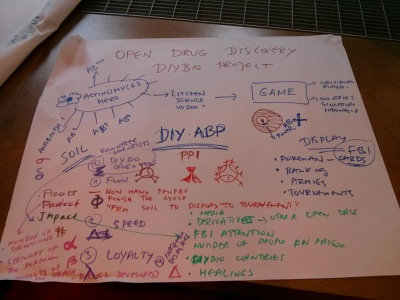Actinomycetes Tournament: Open antibiotics discovery
Picture: Initial brainstorming during the Lorentz Center Future of Art Science Collaboration workshop with Waag Society Open Wetlab
We want to turn microbiology into a game. The goal is to screen soil bacteria, such as Actinomyces, Streptomyces and Micromonospora for antibiotic properties. It is a global citizen science initiative started by the Waag Open Wetlab, which uses game elements (collecting and tournaments) to support open drug discovery of antibiotics. We will isolate actinomycetes from soil samples around the world and screen with Micrococcus luteus or similar microbe to determine their antibiotic properties. Images of inoculated plates will be shared online and based on their strengths (zones of growth inhibition) they will become part of a collection or initiate tournaments between the most successful examples. We will sequence the most powerful ones. We expect cooperation with various DIYbio organizations, microbiology departments and science enthusiasts.
EDITING IN PROGRESS!!
This is a wiki for documentation, sharing links and defining the protocol
Contents
Objectives
1. Improve, standardize and simplify the protocol [1] and its different phases: diluting a soil sample, inoculation on various agar media, incubate for a specified time, cross streaks with non pathogenic bacteria, optimal temperature for incubation, examining growth inhibition, drying or amplifying with various OSHW tools and sending to our potential scientific partner for sequencing.
The game instructions are drafted here [2]
2. Gamification of agar plates: growth inhibition circles in the plates will define various "collections" and the most powerful ones will take part in tournaments. Every participant will have a page with his collection and the most powerful strains will be featured on the main page. All data will be shared under CC for open science with database of GPS data and pictures of the sites where the soil samples were collected and soil bank.
- Currently a Flickr Group is used, but there is a need for a better image sharing platform. [3]
Resources
- [BioStrike Zotero References https://www.zotero.org/groups/biostrike/items]
Further reading:
Bergey's Manual of Systematic Bacteriology - original edition [4]
Who is who in the microbial world? [5]
What are Actinomycetes [6]
How to recognize them? Middle and and right side of this plate [7]
Antibiotics and Actinomycetes classic http://link.springer.com/article/10.1007/BF02861819
Nature of the substrate where you take the sample: those from decaying wood were the least active, whereas those obtained from the rhizosphere of growing plants were most active. At the same time another author cited there says that "high percentage of antagonistic forms which they found in soils from northern regions may be related to the sparser vegetation and to the greater proportion of time during which no plant development occur (scarcity issue? more competition?)"
Example of present research and protocol [8]: the best sites were non agricultural wasteland alkaline soil and compost rich garden soil.
Weird actinomycetes as symbionts with ants [9]
Techniques
Agar diffusion test [10]
We should use Open CFU. Article "OpenCFU, a New Free and Open-Source Software to Count Cell Colonies and Other Circular Objects
[11]
You will need
We will try to make this list modular, so that you can do each part independently. But in general you need the following:
Equipment for
- Autoclave / pressure cooker
- Incubator
- Fridge
- Balance
Consumable materials
- Petri dishes / tupper ware
- Agar / agar agar
- LB complete medium
- Some carbon source: sugar, glycerol, etc
- Some nitrogen source: liquid fertiziler
- Some trace nutrients: vitamin pills
- Bottles
- Water
- Candle, lighter, alcohol
Protocols
The instructions for BioStrike are drafted here: https://drive.google.com/#folders/0BzADIb9rSQQ3WTI4Z0pWOGl2bzg
Scientific / professional:
Example of a professional protocol [12]
Microbiology Tutorials [13]
Discussion
Big Pharma doesn't invest in new antibiotics, there is overuse in animals and humans, which will eventually create a drug resistant bacteria.
[14]
Open Drug Discovery and Big Pharma [15]
Project Documentation
The development of the project is documented on the following platforms:
- [BioStrike Synbiota https://synbiota.com/projects/328/workspace_pages]
- [BioStrike Google Drive https://drive.google.com/#folders/0BzADIb9rSQQ3WTI4Z0pWOGl2bzg]
- [BioStrike workshop at Innoculab http://www.innoculab.org]
- [BioStrike Flickr http://www.flickr.com/groups/2394197@N23/]
DIYbio general - examples to follow
Biocoder [16]
Biohacker projects [17]
GetIt [18]
Biohacking [19]
